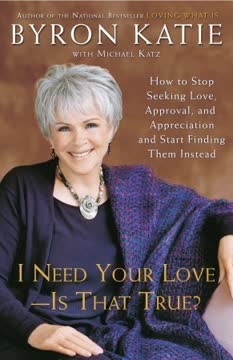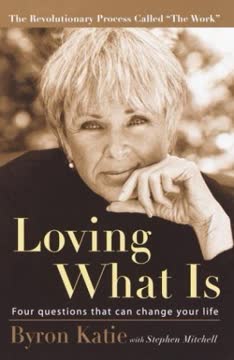Key Takeaways
1. Your Suffering Stems from Unquestioned Thoughts, Not External Reality.
Hurt feelings or discomfort of any kind cannot be caused by another person.
Internal source of pain. The fundamental premise of this work is that our suffering is not caused by external events or other people, but by our own unquestioned thoughts about those events and people. When we believe a stressful thought, we are the ones hurting ourselves. This realization is incredibly empowering, as it means we don't need anyone else to change for us to find peace.
Thoughts create reality. Our most intimate relationship is with our thoughts, and the way we relate to them shapes our entire life. If we believe our stressful thoughts, our lives are filled with stress. For instance, waking up at 3 AM with the thought "Nothing supports me" can trigger a cascade of anxiety, even when, in reality, everything from our chair to the earth itself is supporting our existence.
Challenging assumptions. We often operate under the assumption that our thoughts are facts, especially when they involve others. For example, if someone doesn't wave back, we might think "He insulted me" and react with pain. However, questioning this thought—"What if he didn't see me because he wasn't wearing his glasses?"—reveals that our interpretation, not the event, caused the distress.
2. The Work: Four Questions and Turnarounds to Liberate Your Mind.
Inquiry always leaves us as more loving human beings.
A simple, powerful method. The Work is a process of self-inquiry designed to help you identify and question stressful thoughts. It consists of four questions and a "turnaround" process. This method allows you to discover for yourself whether your thoughts are true and how they impact your life, ultimately revealing who you are without these limiting beliefs.
The Four Questions:
- Is it true? (Does it match your deepest sense of reality?)
- Can you absolutely know that it's true? (Is there any possibility it's not?)
- How do you react when you believe that thought? (What emotions, actions, and physical sensations arise?)
- Who or what would you be without the thought? (Imagine life without that specific belief.)
The Turnaround. After answering the four questions, you reverse the original thought in as many ways as possible (to the self, to the other, to the opposite) and ask if these reversed versions are as true or truer. For example, "He insulted me" could become "I insulted him," "I insulted me," or "He didn't insult me." This step helps to break rigid thinking and open your mind to new perspectives.
3. Seeking External Approval Blocks Genuine Love and Self-Acceptance.
When you say or do anything to please, get, keep, influence, or control anyone or anything, fear is the cause and pain is the result.
The approval trap. From childhood, many of us are conditioned to seek love, approval, and appreciation from others, believing these are keys to happiness. This constant pursuit leads to inauthentic behavior, where we perform "flips" to impress, manipulate, or control how others perceive us, often at the cost of our true selves.
The cost of pretense. When we constantly try to be likable, we leave no room for genuine self-expression or connection. This outward focus creates anxiety and cuts us off from our inner contentment. We might:
- Rehearse conversations to appear clever.
- Monitor others' reactions for signs of approval or disapproval.
- Engage in "mental postmortems" after interactions.
- Lie or exaggerate to make a good impression.
Reclaiming authenticity. The irony is that the struggle to win love and approval makes it difficult to experience them. When we act from fear, we cannot truly receive love because we are trapped in a thought about what we have to do for love. By questioning these thoughts, we realize we don't have to do anything for love; it was all an innocent misunderstanding.
4. "Falling in Love" is Rediscovering Your Own Inner Joy, Not Finding a "Soulmate."
If the love isn’t coming from the other person, whom does that leave? There’s only one person left: you.
Misattributing joy. "Falling in love" is often a powerful experience where we temporarily stop seeking, believing we've found what we were looking for in another person. However, the blissful feeling isn't caused by the other person; it's our own long-lost capacity to experience pure joy, mistakenly attributed to an external source.
The "crush" phenomenon. Consider a first crush: we adore someone, even without hope of reciprocation, and feel immense joy. Years later, we might not understand what we saw in them. This illustrates that the source of that intense feeling was internal—our own heart—not the object of our affection. The other person merely held up a mirror, showing us our own capacity for love.
Love's true source. As long as we believe that love and happiness depend on another person, our joy will be fleeting, vanishing when "painful thoughts cover it over." The realization that we give ourselves the experience of love, and that it's always available within us, frees us from the endless search and the disappointment when relationships inevitably change.
5. True Love Doesn't Demand; It Accepts What Is.
We use our beauty, our cleverness, our charm to capture someone for a partnership, as if he were an animal. And then when he wants to get out of the cage, we’re furious.
Love vs. wants. Many relationships are built on the misconception that "if you love me, you'll do what I want." This belief leads to unspoken rules, scorekeeping, and resentment when partners fail to meet expectations. We try to "capture" others, then get angry when they don't conform to our desires, mistaking control for love.
The "oatmeal" dilemma. People often do things they don't want to do for love, like eating oatmeal they hate for 23 years, fearing that honesty would displease their partner. This "oatmeal" in our lives represents the sacrifices of integrity we make, believing we need to manipulate to maintain love. This leads to:
- Dishonest "yes" when we mean "no."
- Hidden resentments and anger.
- Loss of self and authenticity.
Freedom from demands. Questioning the thought "If you love me, you'll do what I want" reveals its untruth. True love allows others to be as they are, without dictating their actions or feelings. When we separate love from want, we can ask for what we desire without attachment to the outcome, fostering genuine intimacy and freedom for both partners.
6. Perceived Flaws in Others Are Reflections of Your Own Unquestioned Beliefs.
If you see him as flawed in any way, you can be sure that you’ve found a place where you’re arguing with reality in that moment and are blind to yourself.
Flaws as opportunities. What we perceive as flaws in our partners—like being late, snoring, or making mistakes—are not inherent defects but opportunities for self-realization. These "flaws" highlight areas where we are arguing with reality and projecting our own unquestioned thoughts onto others.
Two ways of seeing. Consider a partner with dried egg in his beard before an interview. One way to see him is as "a slob," leading to anger and judgment. The other way, through the eyes of love and inquiry, is to see it as a humorous moment, an opportunity for intimacy, or even a "gift" that allows for a spontaneous act of kindness.
The mirror of relationship. When we are "sick and tired of living with his flaw," it's often because we are sick and tired of our own unquestioned thoughts about that flaw. By turning around judgments like "He's uncaring," we might discover "I'm uncaring" in how we react to him. This shift in perspective allows us to focus on our own internal work rather than trying to change others.
7. Honest Communication and Self-Integrity Lead to Authentic Connection.
A dishonest yes is a no to yourself.
The foundation of connection. Authentic relationships are built on honest communication, which begins with being honest with yourself. Saying "yes" when you mean "no" is a betrayal of your own integrity and creates a barrier to true connection, even if it's done to please others.
Practicing honest "no." It's crucial to identify the fearful thoughts that prevent you from saying "no" when you want to. For example, if your daughter wants the car on a rainy night and you hesitate, question the thought "She'll hate me if I say no." Realize that an honest "no" can be delivered with love and respect, maintaining your integrity while acknowledging their request.
Just ask. Many people live unloved and misunderstood because they don't clearly articulate their desires. Instead, they hint, manipulate, or resent. Learning to "just ask" for what you want, without hidden agendas or fear of rejection, simplifies communication. If others say no, you can then ask yourself how you can meet that need for yourself.
8. Embrace Reality: What Is Happening Is Always What You Need.
I am a lover of what is, not because I’m a spiritual person but because it hurts when I argue with reality.
The wisdom of "what is." A direct route to understanding your needs is to let reality be your guide: "What I need is what I have." This isn't a belief to adopt, but a recognition of how things truly are. Arguing with reality only causes pain and confusion, as no amount of thought can change what is already happening.
Needs are met. If you think you "need" something you don't have, you're living a lie. For example, if you're lying in bed thinking "I need to get up," but you're not getting up, the truth is you don't need to get up until you do. This perspective frees you from self-chastisement and allows you to act from a place of peace rather than internal conflict.
Unexpected gifts. When we stop fighting reality, new possibilities emerge. Missing a flight, spilling coffee, or having plans disrupted can become opportunities for unexpected joy, learning, or connection. The "benevolent reasons" for these events become clear when we stop resisting and instead ask, "How did this happen for me, rather than to me?"
9. Mind Your Own Business: Stay Out of Others' Thoughts and Feelings.
There is no more loving way to be with someone than to stay out of his or her business mentally.
The three kinds of business. Life can be divided into three kinds of business: mine, yours, and God's (or reality's). Much of our stress comes from mentally intruding into others' business—worrying about what they think, feel, or should do. This creates separation and prevents us from living our own lives fully.
The torture chamber. When a partner seems upset and withdraws, mentally intruding means forming theories ("She's angry at me," "She doesn't love me") and then acting on them, demanding explanations. This often escalates conflict and confirms our fears, creating a "torture chamber" of self-inflicted suffering.
Returning to self. Staying in your own business means recognizing that you cannot know or control another person's inner world. Instead of trying to decipher their thoughts, focus on your own. This allows you to lead your own life, appreciate your partner without expectation, and experience a deeper, more authentic connection, free from manipulation or intrusion.
10. Criticism is a Gift: It Reveals What You Haven't Yet Loved in Yourself.
If you tell me that I’m mean, rejecting, hard, unkind, unfair, I say, “Thank you, sweetheart, I can find all these in my life, I have been everything you say, and more."
Embracing feedback. When we experience stress or defensiveness in response to criticism, it signals an unaccepted part of ourselves that we are trying to hide. Instead of resisting, criticism can be seen as a gift, an opportunity to look inward and discover what we haven't yet loved or understood about ourselves.
The path to peace. If someone calls you "aggressive," and you can honestly acknowledge times when you have been, peace arises. The worst thing someone can do is tell you the truth about yourself. By saying "Thank you for letting me know that. You could be right," you disarm the criticism and open yourself to self-discovery.
Integrity in response. Inquiry helps us to genuinely find the truth in criticism. For example, if a friend says, "You don't listen to me," questioning "She's wrong about me" might reveal, "No, sometimes I don't listen." This humility allows for deeper self-awareness and more effective action, transforming potential conflict into an opportunity for growth and closer connection.
11. Self-Love is Not a Goal, But the Natural State After Questioning Your Mind.
No one who thinks “I should love myself” knows what love is. Love is what we are already.
Undoing the search. Just as seeking external love is painful, so is trying to "earn" your own love. Self-love isn't a goal to achieve or a concept to force; it's the natural state that emerges when you sincerely question your unexamined thoughts about yourself.
Un-fooling yourself. Positive affirmations and self-pampering are temporary fixes if underlying stressful thoughts about yourself remain. The path to genuine self-love involves uncovering and questioning your deepest shames, resentments, and unforgiven actions. This process of "un-fooling yourself" reveals your inherent goodness.
The gift of truth. When you question your darkest secrets and turn them around, you discover that what you thought they meant isn't necessarily true. This journey allows your mind to offer other truths, revealing your inherent worth. For example, a woman ashamed of deserting her children might, through inquiry, realize she was also a loving mother in many ways, and that her self-condemnation was a greater source of pain than the original act. This radical honesty leads to profound self-acceptance and freedom.
Last updated:
Review Summary
I Need Your Love - Is That True? presents Byron Katie's method of self-inquiry to challenge thoughts about needing approval from others. Readers found the book's core ideas helpful for improving relationships and self-acceptance, though some criticized oversimplification of complex issues. Many praised Katie's practical questions for examining beliefs, while others felt her approach could be dangerous if misapplied. Overall, readers reported the book as life-changing, offering a simple yet powerful way to question thoughts and find inner peace, despite some controversial elements.
Similar Books
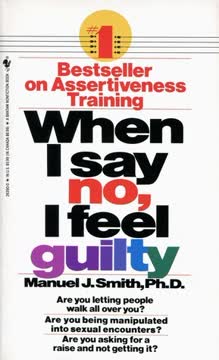
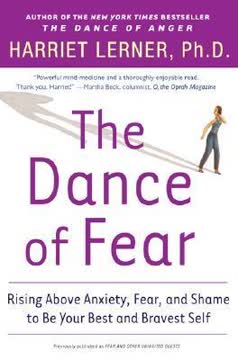

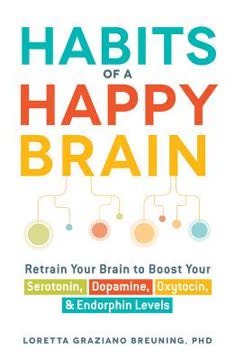
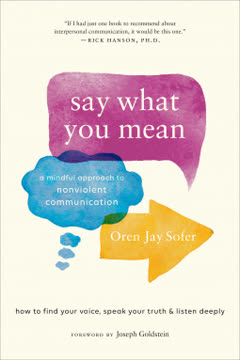
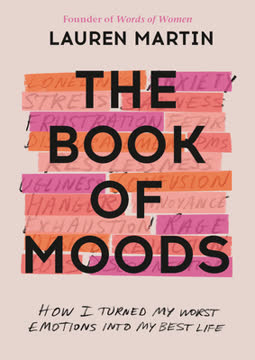
Download PDF
Download EPUB
.epub digital book format is ideal for reading ebooks on phones, tablets, and e-readers.
